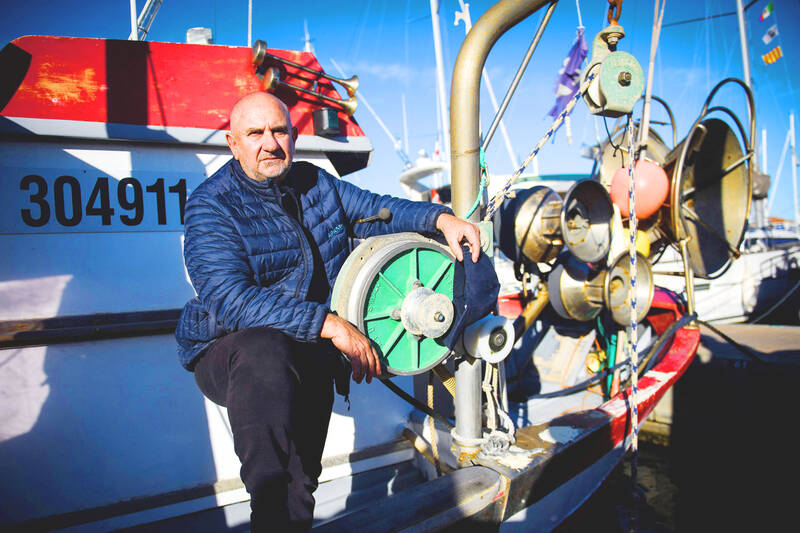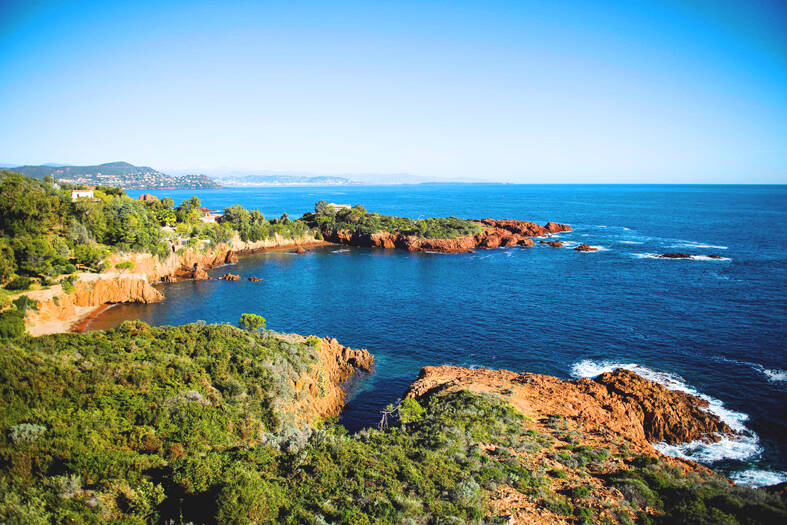A local fishing ban off the southern French coast has won praise from environmentalists and fishers alike, a rare example of biodiversity protection dovetailing with business interests.
Almost two decades after the ban, Cap Roux, a coastal tip of the Esterel mountain range near the commune of Saint-Raphael on the Mediterranean coast, is a biodiversity haven.
It stands in stark contrast to many other places on the Cote d’Azur where unbridled construction, overfishing and heavy shipping traffic have spoiled the once-pristine natural environment.

Photo: AFP
More than 80 species of marine life thrive off Cap Roux, attracted by meadows of seagrass and so-called “living rock” beneath the waves, a fusion of coral and algae.
Fishing here has been forbidden since 2004, a ban covering 450 hectares.
Surprisingly to some, local fishers called for the restriction, saying fish needed a safe place to breed and grow to renew stocks.

Photo: AFP
“Fishermen were worried about their future, and said: ‘Let’s find a space for a nursery that will replenish the surrounding waters,’” said Christian Decugis, Saint-Raphael’s first fishing mediator.
The fish sanctuary lies in the heart of an EU-protected reserve, chosen because it is a relatively unspoilt natural spot, far from the coast’s commercial ports.
“There would have been no point creating a reserve in an area that’s already been messed up,” Decugis said.
The ban has resulted in “many more fish and bigger fish, and an abundance of species,” he said — an observation backed by scientific studies and experiments.
Evidence shows the haven status has helped protect populations of grouper and corb, with scorpion fish and sea bream doing particularly well.
A 2017 study by the Association for Fisheries and Maritime Activities (APAM), which promotes sustainable fishing, said that income for fishers was “significantly higher” near the sanctuary than in zones farther away.
Beyond financial benefits, the new system also improves the reputation of the fishing community, which is often accused of having little concern for the consequences of relentlessly exploiting the sea’s resources.
“The image of a profession that is getting a handle on things and that thinks about tomorrow is very motivating for the fishermen,” Decugis said.
Not everyone is so protective of the restricted zone, with poachers tempted to plunder its healthy and plentiful fish supplies.
“It’s like an open treasure chest,” Decugis said.
Julia Toscano, comanager of the reserve, regularly goes out on a boat between May and September to check the no-fishing zone.
She calls police if she notices anything suspicious. Soon, she hopes there will be cameras to make the job easier.
Many tourists go fishing as they are unaware of the rules, but Toscano said that this is “still poaching.”
Regular campaigns inform visitors of the regulations and explain why the rich fishing grounds are off-limits, but it is a growing challenge: The number of tourists has shot up over the past three years.
Many come on big pleasure boats, typically more than 24m long.
The abundance of fish and colorful reefs also attract divers, who generate 500,000 euros (US$526,875) in income each year for local diving clubs, said Fabien Rozec, who runs the region’s marine life watchdog.
EU funds have enabled the clubs to get hold of eco-friendly buoys, so they no longer have to lower anchors on the fragile seabed.
Even pleasure boats have grown more cautious over the years, anchoring on patches of sand rather than underwater flora, Rozec said.

CHIP WAR: Tariffs on Taiwanese chips would prompt companies to move their factories, but not necessarily to the US, unleashing a ‘global cross-sector tariff war’ US President Donald Trump would “shoot himself in the foot” if he follows through on his recent pledge to impose higher tariffs on Taiwanese and other foreign semiconductors entering the US, analysts said. Trump’s plans to raise tariffs on chips manufactured in Taiwan to as high as 100 percent would backfire, macroeconomist Henry Wu (吳嘉隆) said. He would “shoot himself in the foot,” Wu said on Saturday, as such economic measures would lead Taiwanese chip suppliers to pass on additional costs to their US clients and consumers, and ultimately cause another wave of inflation. Trump has claimed that Taiwan took up to

A start-up in Mexico is trying to help get a handle on one coastal city’s plastic waste problem by converting it into gasoline, diesel and other fuels. With less than 10 percent of the world’s plastics being recycled, Petgas’ idea is that rather than letting discarded plastic become waste, it can become productive again as fuel. Petgas developed a machine in the port city of Boca del Rio that uses pyrolysis, a thermodynamic process that heats plastics in the absence of oxygen, breaking it down to produce gasoline, diesel, kerosene, paraffin and coke. Petgas chief technology officer Carlos Parraguirre Diaz said that in

SUPPORT: The government said it would help firms deal with supply disruptions, after Trump signed orders imposing tariffs of 25 percent on imports from Canada and Mexico The government pledged to help companies with operations in Mexico, such as iPhone assembler Hon Hai Precision Industry Co (鴻海精密), also known as Foxconn Technology Group (富士康科技集團), shift production lines and investment if needed to deal with higher US tariffs. The Ministry of Economic Affairs yesterday announced measures to help local firms cope with the US tariff increases on Canada, Mexico, China and other potential areas. The ministry said that it would establish an investment and trade service center in the US to help Taiwanese firms assess the investment environment in different US states, plan supply chain relocation strategies and

Japan intends to closely monitor the impact on its currency of US President Donald Trump’s new tariffs and is worried about the international fallout from the trade imposts, Japanese Minister of Finance Katsunobu Kato said. “We need to carefully see how the exchange rate and other factors will be affected and what form US monetary policy will take in the future,” Kato said yesterday in an interview with Fuji Television. Japan is very concerned about how the tariffs might impact the global economy, he added. Kato spoke as nations and firms brace for potential repercussions after Trump unleashed the first salvo of